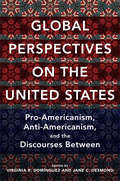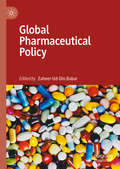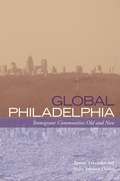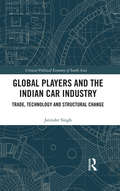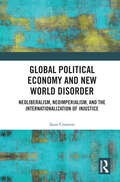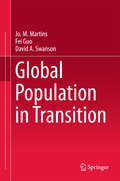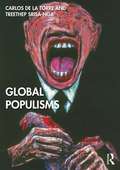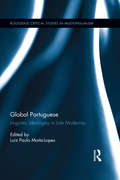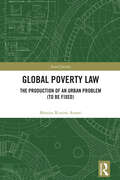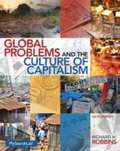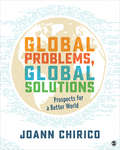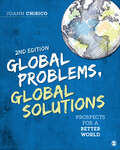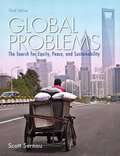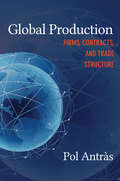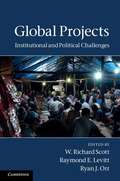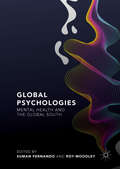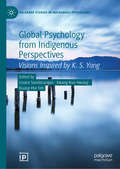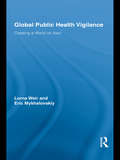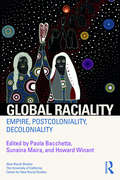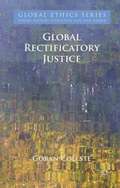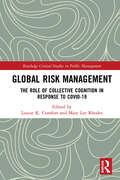- Table View
- List View
Global Perspectives on the United States: Pro-Americanism, Anti-Americanism, and the Discourses Between
by Jane Desmond Virginia DominguezThis daring collaborative effort showcases dialogues between international scholars engaged with the United States from abroad. The writers investigate the analytic methods and choices that label certain talk, images, behaviors, and allusions as "American" and how to read the data on such material. The editors present the essays in pairs that overlap in theme or region. Each author subsequently comments on the other's work. A third scholar or team of scholars from a different discipline or geographic location then provides another level of analysis. Contributors: Andrzej Antoszek, Sophia Balakian, Zsófia Bán, Sabine Bröck, Ian Condry, Kate Delaney, Jane C. Desmond, Virginia R. Dominguez, Ira Dworkin, Richard Ellis, Guillermo Ibarra, Seyed Mohammad Marandi, Giorgio Mariani, Ana Mauad, Loes Nas, Edward Schatz, Manar Shorbagy, Kristin Solli, Amy Spellacy, and Michael Titlestad.
Global Pharmaceutical Policy
by Zaheer-Ud-Din BabarMedicines are vital in improving patient health outcomes and pharmaceutical policy is a fundamental component of any health system. However, the global pharmaceutical policy is ever-evolving and data and quality ‘research-based information’ in this field are scarce. This book fills this gap and provides up-to-date empirical information and evidence-based synthesis. It focuses on pertinent key issues in global pharmaceutical policy including medicines safety, generic medicines, pharmaceutical supply chain, medicines financing, access and affordability of medicines, rational use of medicines, pharmacy health services research and access to vaccines and biological products. Featuring policy case studies from varied countries such as Mexico, Russia, China, Kyrgyzstan, and Pakistan, this book comprises a valuable and comprehensive resource for students, funders, policymakers, academics, and researchers interested in this field.
Global Philadelphia: Immigrant Communities Old and New
by Mary Johnson Takenaka Ayumi OsirimThe racial and ethnic composition of Philadelphia continues to diversify as a new wave of immigrants—largely from Asia and Latin America—reshape the city’s demographic landscape. Moreover, in a globalized economy, immigration is the key to a city’s survival and competitiveness. The contributors to Global Philadelphiaexamine how Philadelphia has affected its immigrants’ lives, and how these immigrants, in turn, have shaped Philadelphia. Providing a detailed historical, ethnographic, and sociological look at Philadelphia’s immigrant communities, this volume examines the social and economic dynamics of various ethnic populations. Significantly, the contributors make comparisons to and connections between the traditional immigrant groups—Germans, Italians, the Irish, Jews, Puerto Ricans, and Chinese—and newer arrivals, such as Cambodians, Haitians, Indians, Mexicans, and African immigrants of various nationalities. While their experiences vary, Global Philadelphia focuses on some of the critical features that face all immigrant groups—intra-group diversity, the role of institutions, and ties to the homeland. Taken together, these essays provide a richer understanding of the processes and implications of contemporary immigration to the area.
Global Players and the Indian Car Industry: Trade, Technology and Structural Change (Critical Political Economy of South Asia)
by Jatinder SinghThis book is one of the first critical analyses of the automobile industry in India. It studies the sector in general and the passenger car industry in particular, and provides valuable insights into the operation of Foreign Direct Investment (FDI) companies in a technology-intensive industry under changing economic regimes. The volume underlines the influence of the changing nature of foreign investment, the impact of economic reforms, technology regimes and industrial policy on growth, structural changes and development. It offers a detailed account of the trade performance of manufacturers in India’s passenger car industry. It also looks at successful cases to draw policy lessons towards encouraging quality FDI and developing India as a base for world production. A useful addition to industry studies in India, this book with its wide coverage and contemporary analyses will interest scholars and researchers of economics, Indian economy and industrial policy, industrial economics, automobile industry and manufacturing sector, development economics and international economics. It will also appeal to policymakers, practitioners and industrial associations.
Global Political Economy and New World Disorder: Neoliberalism, Neoimperialism, and the Internationalization of Injustice
by Sean CreavenDrawing upon a range of resources of critique (including critical realist social theory, realist international relations theory, the sociology of globalization, the Marxist critique of imperialism, and dependency theory), this book is an essential contribution to the critical understanding of nationalism and imperialism in the global age. It conducts a sustained and in-depth analysis of the relations between the asymmetry in the distribution of economic resources and powers of command, and the recent play of political events involving imperialist wars, including the Russo-Ukrainian and Israeli-Hamas wars. Crucially, the author argues that establishing these connections requires theorizing political economy in the so-called global age as comprised of neoimperial and neoliberal orders. As such, the book offers a new interpretation of the relations between neoliberalism and neoimperialism, and between modes of organizing social relations and resulting global disorders and instabilities. This will therefore be of interest to researchers, scholars, and students working at the intersection of global political economy, international relations, and the sociology of globalization.
Global Population in Transition
by David A. Swanson Jo. M. Martins Fei GuoThis book deals with macro and micro aspects of population change and their inter-face with socio-economic factors and impact. It examines theoretical notions and pursues their empirical manifestations and uses multidisciplinary approaches to population change and diversity. It investigates the organic nature of the relationships between socio-economic factors and population change and the feedback loops that affect socio-economic organisation and behaviour. The book brings together material often scattered in a number of sources and disciplines that helps to understand population change and their socio-economic aspects. In addition to dealing with the more conventional factors in population dynamics in the form of fertility, mortality and migration, the book examines socio-economic forces that influence them. It discusses population evolving attributes that affect population characteristics and social and behaviour and impact on the environment. Further, it deals with social organisation and pathways that lead to different social and economic development and standards of living of diverse populations.
Global Populisms (Routledge International Handbooks Ser.)
by Carlos de la Torre Treethep Srisa-ngaThis ground-breaking textbook describes and explains the global manifestations of populism. It reviews controversies about its relationships with democracy in the distinct and interrelated histories of the Americas, Asia, and Europe. The volume surveys the similarities and differences between populism, nationalism, fascism, and populist uses of religion and the media. Global Populisms invites students and the general public to move beyond simplistic conceptualizations of populism as an external virus and as an irrational threat to democracy, or, alternatively, as the path to return power to the people. The book differentiates populists’ correct critiques to inequalities, the loss of national sovereignty, and unresponsive politicians from its solutions. In the name of giving power to the people, populists in power from Hugo Chávez to Donald Trump, Narendra Modi, and Viktor Orbán entered in war with the media, made rivals into existential enemies, and attempted to concentrate power in the hands of the president. Written in a clear and accessible style, this interdisciplinary volume will appeal to undergraduate students as well as to non-academic audiences with an interest in political science, sociology, history, and communication studies.
Global Portuguese: Linguistic Ideologies in Late Modernity (Routledge Critical Studies in Multilingualism)
by Luiz Paulo Moita-LopesThis book aims at deconstructing and problematizing linguistic ideologies related to Portuguese in late modernity and questioning the theoretical presuppositions which have led us to call Portuguese ‘a language.’ Such an endeavor is crucial when we know that Portuguese is a language which is increasingly internationalized, used as the official language in four continents (in ten countries) and which has come to play a relevant role in the so-called linguistic market on the basis of the geopolitical transformations in a multipolar world. The book covers a wide range of social, political and historical contexts in which ‘Portuguese’ is used (in Brazil, Canada, East-Timor, England, Portugal, Mozambique and Uruguay), and considers diverse linguistic practices. Through this critique, contributors chart new directions for research on language ideologies and language practices (including research related to Portuguese and to other ‘languages’) and consider ways of developing new conceptual compasses that are better attuned to the sociolinguistic realities of the late modern era, in which people, texts and languages are increasingly in movement through national borders and those of digital networks of communication.
Global Poverty Law: The Production of an Urban Problem (To Be Fixed) (ISSN)
by Moniza Rizzini AnsariThis book demonstrates how the various legal efforts employed to eradicate global urban poverty also play a significant role in shaping it.Urban poverty has been widely examined as a social problem that requires attention and social commitment. Law is often seen as both an important contributor to the problem as well as a source of crucial tools to overcome it. In spite of this, however, poverty is surprisingly disregarded within legal scholarship. This book counters this by drawing on legal theory, legal history, and legal geography to inquire how urban poverty is made visible and invisible as a problem across global cities. More specifically, it investigates the mechanisms and networks through which global urban poverty has been conceptually and materially shaped in a way that fits the remit of global corporate philanthropy and the development aid agenda. By following law’s circuitous interactions with poverty knowledge and antipoverty interventions, the book demonstrates how it plays a historical role in making poverty seen, known, and remedied. As a result, the book argues, law consolidates a stable image of poverty as an essential ‘problem’ – to be uniformly found worldwide and so reasonably fixable with the appropriate legal reforms. Taking poverty to be a fundamental manifestation of social injustice, the book thus raises key questions about the role of law in the achievement of social justice.This innovative and insightful account of the relationship between law and poverty will appeal to scholars in critical and socio-legal studies, as well as others working in poverty studies, urban studies, development studies, geography, sociology, and social policy.
Global Powers
by Ralph SchroederMichael Mann is a central figure in contemporary sociology. His analysis of how the four sources of social power - ideological, economic, military and political - have shaped world history is a major contribution to social science. In this volume, distinguished scholars assess Mann's work, focusing on his final two volumes of Sources of Social Power, which deal with the twentieth and twenty-first centuries. They tackle some of the major themes in Mann's work including globalisation, American empire and the recent financial crisis. They also question his stance on some perennial topics in sociology: is the trajectory of American society 'exceptional'? How is military power different from the other sources of power? What is the role of agency and ideology in social change? How do the relations between states affect domestic social development? Global Powers will provoke debate among all those interested in understanding the next phase of globalisation.
Global Problems and the Culture of Capitalism
by Richard H. Robbins<p>Examines the development and impact of capitalist culture. <p>From its roots more than 500 years ago to the present day, capitalism expanded from Western Europe to the United States and then to much of the rest of the world. This expansion has not gone uncontested; resistance has been both direct and indirect, including political, religious, and social protest, and even revolution. How and why capitalist culture developed and the reasons why some groups resisted and continue to resist its development are among the issues explored in Global Problems and the Culture of Capitalism, 6/e.</p>
Global Problems, Global Solutions: Prospects for a Better World
by JoAnn A. ChiricoGlobal Problems, Global Solutions: Prospects for a Better World by JoAnn Chirico approaches social problems from a global perspective with an emphasis on using one’s sociological imagination. Perfect for instructors who involve students in research, this text connects problems borne by individuals to regional, global, and historical forces, and stresses the importance of evidence in forming opinions and policies addressing social issues. The book introduces readers to the complexities of the major problems that confront us today such as violent conflict, poverty, climate change, human trafficking and other issues that we encounter in our lives. It book concludes with a chapter on politics and government, underscoring the need for good governance at all levels–and cooperation among many layers of government–to build a better world.
Global Problems, Global Solutions: Prospects for a Better World
by JoAnn A. ChiricoGlobal Problems, Global Solutions: Prospects for a Better World by JoAnn Chirico approaches social problems from a global perspective with an emphasis on using one’s sociological imagination. Perfect for instructors who involve students in research, this text connects problems borne by individuals to regional, global, and historical forces, and stresses the importance of evidence in forming opinions and policies addressing social issues. The book introduces readers to the complexities of the major problems that confront us today such as violent conflict, poverty, climate change, human trafficking and other issues that we encounter in our lives. It book concludes with a chapter on politics and government, underscoring the need for good governance at all levels–and cooperation among many layers of government–to build a better world.
Global Problems, Global Solutions: Prospects for a Better World
by JoAnn A. ChiricoGlobal Problems, Global Solutions: Prospects for a Better World approaches social problems from a global perspective with an emphasis on using one’s sociological imagination. Perfect for instructors who involve students in research, this text connects problems borne by individuals to regional, global and historical forces, and stresses the importance of evidence in forming opinions and policies addressing social issues. The Second Edition explores three broad themes--nourishing human capital, restoring civility, and sustaining natural and manufactured environments--as it examines the causes and consequences of a range of problems related to economic inequality, discrimination and persecution, war and violence, food production, population flows, health and longevity, the environment, and other issues that we encounter in our lives. The book concludes with a chapter on politics and government, underscoring the need for good governance at all levels–and cooperation among many layers of government–to build a better world.
Global Problems, Global Solutions: Prospects for a Better World
by JoAnn A. ChiricoGlobal Problems, Global Solutions: Prospects for a Better World approaches social problems from a global perspective with an emphasis on using one’s sociological imagination. Perfect for instructors who involve students in research, this text connects problems borne by individuals to regional, global and historical forces, and stresses the importance of evidence in forming opinions and policies addressing social issues. The Second Edition explores three broad themes--nourishing human capital, restoring civility, and sustaining natural and manufactured environments--as it examines the causes and consequences of a range of problems related to economic inequality, discrimination and persecution, war and violence, food production, population flows, health and longevity, the environment, and other issues that we encounter in our lives. The book concludes with a chapter on politics and government, underscoring the need for good governance at all levels–and cooperation among many layers of government–to build a better world.
Global Problems: The Search for Equity, Peace, and Sustainability
by Scott R. SernauExploring social problems on a global scale . This text uses social science perspectives to examine the various dimensions of globalization, the social problems of inequality, war and violence, and environmental sustainability that are occurring on a global scale. Clear writing and vivid examples help students to better understand their role as global citizens. The book was designed for courses such as Global Issues, Contemporary Problems, Social Problems, Social Stratification, World Cultures, and Social Change. Learning Goals Upon completing this book, readers should be able to: Understand social problems on a global scale - from inequalities to sustainability See the interconnections of the world and people throughout the world Learn about issues with a multinational and multidisciplinary approach, so readers will be able to have a broader understanding of the subject
Global Production
by Pol AntràsGlobal Production is the first book to provide a fully comprehensive overview of the complicated issues facing multinational companies and their global sourcing strategies. Few international trade transactions today are based on the exchange of finished goods; rather, the majority of transactions are dominated by sales of individual components and intermediary services. Many firms organize global production around offshoring parts, components, and services to producers in distant countries, and contracts are drawn up specific to the parties and distinct legal systems involved. Pol Antràs examines the contractual frictions that arise in the international system of production and how these frictions influence the world economy.Antràs discusses the inevitable complications that develop in contract negotiation and execution. He provides a unified framework that sheds light on the factors helping global firms determine production locations and other organizational choices. Antràs also implements a series of systematic empirical tests, based on recent data from the U.S. Customs and Census Offices, which demonstrate the relevance of contractual factors in global production decisions. Using an integrated approach, Global Production is an excellent resource for researchers, graduate students, and advanced undergraduates interested in the inner workings of international economics and trade.
Global Projects
by W. Richard Scott Raymond E. Levitt Ryan J. OrrAn analysis of the institutional and social movement processes that surround global infrastructure projects.
Global Psychologies: Mental Health and the Global South
by Roy Moodley Suman FernandoThis book critiques our reliance on Eurocentric knowledge in the education and training of psychology and psychiatry. Chapters explore the diversity of ‘constructions of the self’ in non-Western cultures, examining traditional psychologies from Africa, Asia, Australasia, and Pre-Columbian America. The authors discuss liberation psychologies and contemporary movements in healing and psychological therapy that draw on both Western and non-Western sources of knowledge. A central theme confronted is the importance, in a rapidly shrinking world, for knowledge systems derived from diverse cultures to be explored and disseminated equally. The authors contend that for this to happen, academia as a whole must lead in promoting cross-national and cross-cultural understanding that is free of colonial misconceptions and prejudices. This unique collection will be of value to all levels of study and practice across psychology and psychiatry and to anyone interested in looking beyond Western definitions and understandings.
Global Psychology from Indigenous Perspectives: Visions Inspired by K. S. Yang (Palgrave Studies in Indigenous Psychology)
by Kwang-Kuo Hwang Louise Sundararajan Kuang-Hui YehThis volume celebrates the visions of a more equitable global psychology as inspired by the late Professor K. S. Yang, one of the founders of the indigenous psychology movement. This unprecedented international debate among leaders in the field is essential for anyone who wishes to understand the movement from within—the thinking and the vision of those who are the driving forces behind the movement. This book should appeal to scholars and students of psychology, sociology, anthropology, ethnology, philosophy of science, and postcolonial studies.
Global Public Health Vigilance: Creating a World on Alert (Routledge Studies in Science, Technology and Society)
by Lorna Weir Eric MykhalovskiyGlobal Public Health Vigilance is the first sociological book to investigate recent changes in how global public health authorities imagine and respond to international threats to human health. This book explores a remarkable period of conceptual innovation during which infectious disease, historically the focus of international disease control, was displaced by "international public health emergencies," a concept that brought new responsibilities to public health authorities, helping to shape a new project of global public health security. Drawing on research conducted at the World Health Organization, this book analyzes the formation of a new social apparatus, global public health vigilance, for detecting, responding to and containing international public health emergencies. Between 1995 and 2005 a new form of global health surveillance was invented, international communicable disease control was securitized, and international health law was fundamentally revised. This timely volume raises critical questions about the institutional effects of the concept of emerging infectious diseases, the role of the news media in global health surveillance, the impact of changes in international health law on public health reasoning and practice, and the reconstitution of the World Health Organization as a power beyond national sovereignty and global governance. It initiates a new research agenda for social science research on public health.
Global Raciality: Empire, PostColoniality, DeColoniality (New Racial Studies)
by Sunaina Maira Howard Winant Paola BacchettaGlobal Raciality expands our understanding of race, space, and place by exploring forms of racism and anti-racist resistance worldwide. Contributors address neoliberalism; settler colonialism; race, class, and gender intersectionality; immigrant rights; Islamophobia; and homonationalism; and investigate the dynamic forces propelling anti-racist solidarity and resistance cultures. Midway through the Trump years and with a rise in nativism fervor across the globe, this expanded approach captures the creativity and variety found in the fight against racism we see the world over. Chapters focus on both the immersive global trajectories of race and racism, and the international variation in contemporary configurations of racialized experience. Race, class, and gender identities may not only be distinctive, they can extend across borders, continents, and oceans with remarkable demonstrations of solidarity happening all over the world. Palestinians, Black Panthers, Dalit, Native Americans, and Indian feminists among others meet and interact in this context. Intersections between race and such forms of power as colonialism and empire, capitalism, gender, sexuality, religion, and class are examined and compared across different national and global contexts. It is in this robust and comparative analytical approach that Global Raciality reframes conventional studies on postcolonial regimes and racial identities and expression.
Global Rectificatory Justice (Global Ethics Series )
by Göran CollsteWhat are the implications of colonialism for a theory of global justice today? What does rectificatory justice mean in the light of colonialism? What does global rectificatory justice require in practice? The author seeks to answer these questions covering a significant gap in the literature on global justice.
Global Risk Management: The Role of Collective Cognition in Response to COVID-19 (ISSN)
by Louise K. Comfort Mary Lee RhodesThe rise and spread of Covid-19 in the beginning of 2020 presents a once-in-a-century challenge and opportunity for decision makers, managers, scholars, and citizens to understand the risks, mitigate its impact and prepare for future crises. Drawing on a global network of scholars, this book presents a comparative analysis of ten nations’ response to a global pandemic, while operating nominally under the framework of the World Health Organization. The book introduces the concept of ‘collective cognition’ as an analytic lens for examining the nations’ response to Covid-19 during the first six months of the emerging pandemic (January – June 2020) and draws out insights for improving systems of global risk management. This book addresses four primary audiences: policy-makers and leaders in nations struggling to contain viruses while guiding their societies under threat; academic researchers, students, and educators engaged in preparing the next generation of professionals committed to investigating emerging risk: managers of non-profit and private organizations that operate and maintain the networks of social, technical, and economic services that are essential to functioning communities; and the informed general public interested in understanding this extraordinary sequence of events and in managing the novel risk of COVID-19 in a more informed, responsible way.
Global Risk Management: The Role of Collective Cognition in Response to COVID-19 (Routledge Critical Studies in Public Management)
by Louise K. Comfort Mary Lee RhodesThe rise and spread of Covid-19 in the beginning of 2020 presents a once-in-a-century challenge and opportunity for decision makers, managers, scholars, and citizens to understand the risks, mitigate its impact and prepare for future crises. Drawing on a global network of scholars, this book presents a comparative analysis of ten nations’ response to a global pandemic, while operating nominally under the framework of the World Health Organization. The book introduces the concept of ‘collective cognition’ as an analytic lens for examining the nations’ response to Covid-19 during the first six months of the emerging pandemic (January – June 2020) and draws out insights for improving systems of global risk management. This book addresses four primary audiences: policy-makers and leaders in nations struggling to contain viruses while guiding their societies under threat; academic researchers, students, and educators engaged in preparing the next generation of professionals committed to investigating emerging risk: managers of non-profit and private organizations that operate and maintain the networks of social, technical, and economic services that are essential to functioning communities; and the informed general public interested in understanding this extraordinary sequence of events and in managing the novel risk of COVID-19 in a more informed, responsible way.
